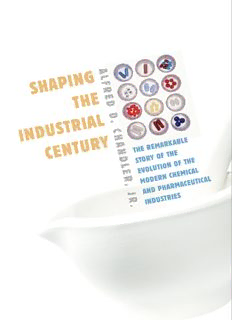
Shaping the Industrial Century: The Remarkable Story of the Evolution of the Modern Chemical and Pharmaceutical Industries (Harvard Studies in Business History) PDF
Preview Shaping the Industrial Century: The Remarkable Story of the Evolution of the Modern Chemical and Pharmaceutical Industries (Harvard Studies in Business History)
HARVARD STUDIES IN BUSINESS HISTORY, 46 PublishedwiththesupportoftheHarvardBusinessSchool EditedbyThomasK.McCraw IsidorStrausProfessorofBusinessHistory GraduateSchoolofBusinessAdministration GeorgeF.BakerFoundation HarvardUniversity Alfred D. Chandler, Jr. Shaping the Industrial Century The Remarkable Story of the Evolution of the Modern Chemical and Pharmaceutical Industries HARVARD UNIVERSITY PRESS Cambridge,Massachusetts,andLondon,England 2005 Copyright©2005bythePresidentandFellowsofHarvardCollege Allrightsreserved PrintedintheUnitedStatesofAmerica LibraryofCongressCataloging-in-PublicationData Chandler,AlfredDupont. Shapingtheindustrialcentury : theremarkablestoryofthemodernchemicaland pharmaceuticalindustries / AlfredD.Chandler,Jr. p. cm.—(Harvardstudiesinbusinesshistory ; 46) Includesbibliographicalreferencesandindex. ISBN0-674-01720-X(alk.paper) 1.Chemicalindustry—UnitedStates—History. 2.Chemicalindustry—Europe—History. 3.Pharmaceuticalindustry—UnitedStates—History. 4.Pharmaceuticalindustry—Europe— History. 5.Biotechnologyindustries—UnitedStates. I.Title. II.Series. HD9651.5.C457 2005 338.4′766′00973—dc22 2004054320 Contents Preface vii Acknowledgments ix I Overview 1 Differences,Concepts,Themes,andApproach 3 2 EvolvingPathsofLearning 19 II TheChemicalIndustry 3 TheMajorAmericanCompanies 41 4 TheFocusedAmericanCompanies 83 5 TheEuropeanCompetitors 114 6 TheAmericanCompetitors 144 III ThePharmaceuticalIndustry 7 TheAmericanCompanies:ThePrescriptionPath 177 8 TheAmericanCompanies:TheOver-the-CounterPath 213 9 TheAmericanandEuropeanCompetitors 230 10 CommercializingBiotechnology 260 vi Contents IV PathsofLearning 11 TheThreeRevolutions:Industrial,Information,and Biotechnology 283 Notes 315 Index 345 Preface My previous book, Inventing the Electronic Century: The Epic Story of the Con- sumerElectronicsandComputerIndustries,focusedonthecreationoftheinfra- structureoftheInformationRevolutionbetweenthe1950sandthe1990s,a revolutionthatwillcontinuetotransformlifeandworkonthisplanetover thedecadestocome.Thepresentvolumeconcentratesontheevolutionof tworelatedhigh-technologyindustriesoftheSecondIndustrialRevolution after the completion of their infrastructure. Their infrastructure, as were thoseofnearlyallmodernindustries,beganinthe1880swhentherailroad andsteamship,thetelegraphandcable,madepossiblemassproductionand distributionofgoodsandservicestonationalandinternationalmarkets. By the 1920s the creation of the infrastructure had been completed. Of thefiftyleadingchemicalcompaniesandthethirtyleadingpharmaceutical companiesintermsofrevenuesinthe1990s,onlytwochemicalcompanies hadenteredsuccessfullyandtheydidsoduringWorldWarII.Therefore,this volume,whichreviewsthecreationofthechemicalandpharmaceuticalin- frastructure, concentrates on the evolution of these eighty companies dur- ingthenextseventyyears. As a result, the hazards of writing what becomes contemporary history areevengreaterthanwastrueinmyearlierbook.Ihadplannedtoendthe stories of the individual companies in 1993, the year I began research on thesetwohigh-techindustries.Writing,however,tookmoretimethanan- ticipated, as it always does. Hence, I wrote postscripts at the end of some chapters.Forexample,bythebeginningofthenewcentury,theattemptsof themajorU.S.companiestoenterpharmaceuticalshadfailed. Fortunatelyinmeetingthesehazardsthebusinesspresshadenhancedits coverage.Thepresswasprovidingthestatisticalandinformationdatabase viii Preface from which the limited success and failure of the individuals in terms of financialperformanceandinnovativesuccesscouldbeappraised. NosourcewasmorevaluablethanHoover’sHandbooks,producedannually since 1990 for both American and non-American companies. Each hand- bookincludesaten-yearreviewofthecompanies’financialstatisticsanda portfolio of their major product lines, with percentage of sales and income fromtheselinesaswellasabriefresumeoftheirhistory.Hoover’sHandbooks certainlyremainareliablebasicsourceforbusinessandeconomichistorians tocarryouttheircentralanalyticaltasks. Acknowledgments Oftheseveralpersonswhomadepossiblethewritingofthisbook,themost importantwerethetwotowhomIhavededicatedit—AnneO’Connelland my wife, Fay Chandler. For many years Anne has transcribed my garbled, dictated, handwritten copy into smooth, readable typescript, at the same time keeping the numerous revisions of the text and the endnotes in their proper order and place. Just as critical has been Fay’s constant encourage- mentandsupport,aswereachedoursixtiethweddinganniversary. TheinitialresearchandwritingwasachievedwiththeassistanceofTakashi Hikino and Andrew von Nordenflycht. Before Takashi had to return to his homeland,Japan,hisassistancewasessentialingettingthiswritingunderway, aswellasinshapingtheinitialdraftsofthechapters.Andrewplayedascriti- calaroleinthecompletionofthebook,particularlyinthosechapterscon- cerningthechemicalstory.MaxHallcopyeditedtheinitialdraftsofchapters. Lance Wickens did the same for the finished manuscript. I am indeed in- debtedtoboth.EileenHankinsprovidedessentialsecretarialandlibraryser- vices. At the front desk of my apartment building in Cambridge, Theresa Hardyfaxedmessagesandcorrespondenceandassistedinotherways. I am particularly indebted to Ralph Landau, who provided a valuable learningexperienceataseriesofmeetingsatStanfordUniversityinprepara- tionforthepublication(withAshishAroraandNathanRosenberg)ofChem- icalsandLong-TermGrowth,publishedbyJohnWileyin1998. IammostbeholdentoDavisDyer,thefoundingdirectoroftheWinthrop Group, who made a careful review of the chemical story, as did Louis Galambos of the pharmaceutical story. In addition, Davis persuaded me to sharpen the focus of the book’s major themes. I continue to benefit from RobertWallace’sadviceandsupport. Manyhavecontributedtothisbook,butthefinaltextismine,andforitI takefullresponsibility.
Description: